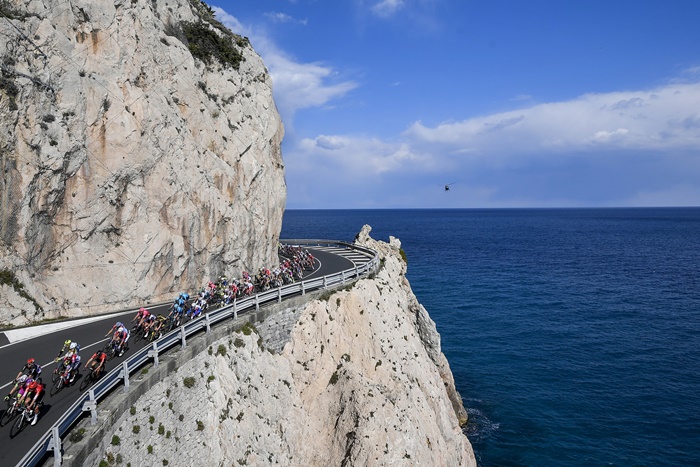
The big springtime one-day races represent the divide between people who really follow cycling and people who very much like it and will definitely watch it when it’s on ITV4 but probably won’t actively seek it out.
Whichever group you fall into, here’s a recap.
Milan-Sanremo
Milan-Sanremo came to a head as it always does, with someone attacking over the top of the Poggio climb a handful of kilometres from the finish. In each of the last three years, that person has been Julian Alaphilippe.
The world champion’s getting diminishing returns from his move though. After winning in 2019 and finishing second to Wout van Aert last year, he could only manage 16th this time around. Quite a few riders stuck with him and he ended up swamped.
The move was predictable and so was a sprint finish – which was why Belgian rider Jasper Stuyven pre-empted it, surging away on a nondescript stretch of road at the one moment in the closing stages when no-one thought there was going to be an attack.
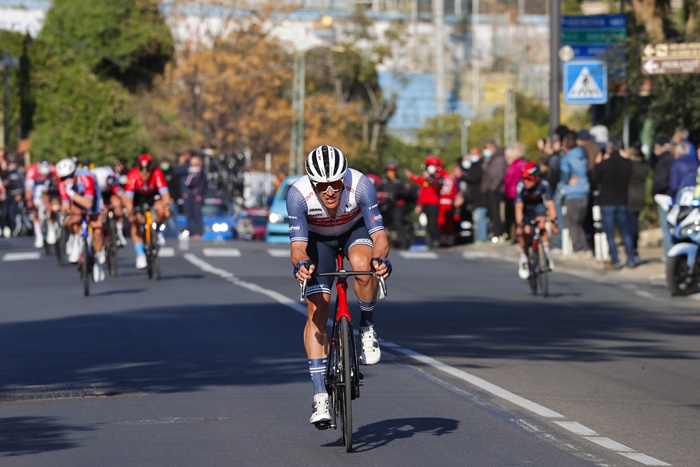
He managed to hold everyone off to the line and so became a somewhat unlikely winner.
Speaking afterwards, the Belgian acknowledged that at the moment people view one-day races as having been won by Alaphilippe, Wout van Aert, Mathieu van der Poel or A.N. Other.
“There are three guys who are really strong – everyone knows that and everyone talked about it. But that didn’t mean we weren’t going to race for the win.”
Onto the cobbles
Next up was E3 Harelbeke (which is currently known as E3 Saxo Bank Classic – so basically a motorway and a bank). This was won by Kasper Asgreen, the Danish national road and time trial champion and an increasingly significant figure at this time of year. After that, it was Gent-Wevelgem, which was won by van Aert.
Those two races are however really just staging posts en route to the two biggies of this part of the season: the Tour of Flanders and Paris-Roubaix. Unfortunately, the latter has been pushed back to October because of the coronavirus lockdown in France, so de Ronde was basically the cobbled final.
Maybe next year they’ll add a name to that Alaphilippe, van Aert, van der Poel trio of favourites because this too was won by Asgreen. Only van der Poel could stay with him to contest the sprint, but the Dutchman very visibly conceded metres before the line.
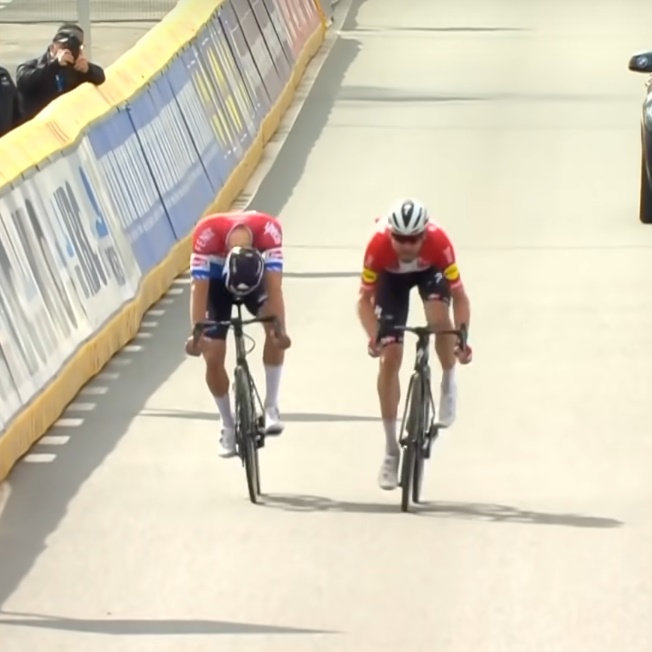
The women’s race was won by Annemiek van Vleuten, a mere 10 years after she first won it.
Into the hills
Ardennes Week – which comprises the three hilly one-day races, Amstel Gold, La Fleche Wallonne and Liege-Bastogne-Liege – is when cycling moves towards more familiar territory. The weather gets warmer, the race favourites get lighter and everyone suddenly has an eye on the upcoming Giro d’Italia and the Tour de France beyond that.
The Amstel Gold podium illustrated this annual segue rather well, van Aert edging out fellow cyclo-cross alumnus Tom Pidcock with German Grand Tour specialist Max Schachmann in third. No matter what the race, Van Aert has barely finished outside the top ten all season.
La Fleche Wallonne was the usual five minutes of agonising uphill racing after a 200-and-odd kilometre preamble. Julian Alaphilippe has taken over from Alejandro Valverde as the best at this kind of effort and he won for the third time in four years, just ahead of Primoz Roglic.
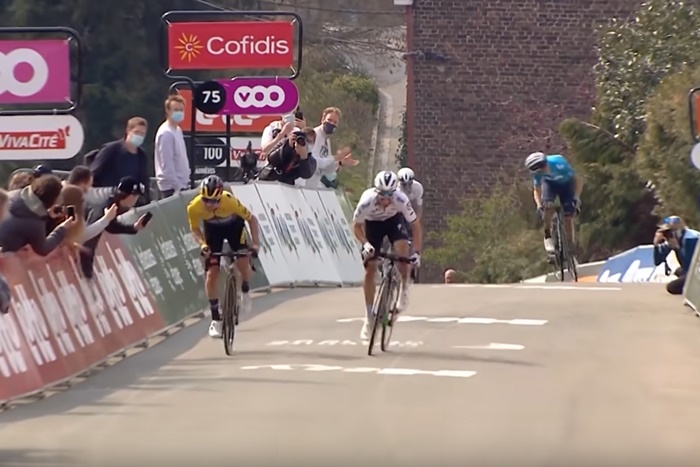
The transition into Grand Tour racing was then completed at Liege-Bastogne-Liege at the climax of the third Monument of the season.
Five men arrived at the finish together and 2020 Tour de France winner Tadej Pogacar edged out Alaphilippe for his first big one-day win.
The women’s race was won by Dutch rider Demi Vollering. Never one to turn down a terrible joke, I’ll say that we’re catching the 24-year-old on the way up.
That’s pretty much it for one-day racing for the time being, but let’s also take a quick detour to a relatively minor stage race where significant events recently took place.
Bit of a dry spell
Mark Cavendish has been variously sick and injured for much of the last few years. This has prevented him winning any races. Unfortunately for him, he’s also been ageing that whole time.
This means that even if he’s seemingly now emerged the other side of his many physical ailments, he’s emerged as a 35-year-old, which is not the age he was the last time he was in decent health.
This explains why an awful lot of people felt that his final professional victory was going to be an otherwise unremarkable stage win at the 2018 Dubai Tour.
But lo! What’s this? Cav finally crossed the line first again earlier this month, a mere 1,159 days after he last did so. He then waited exactly one more day before winning again. And then the next day he won again.
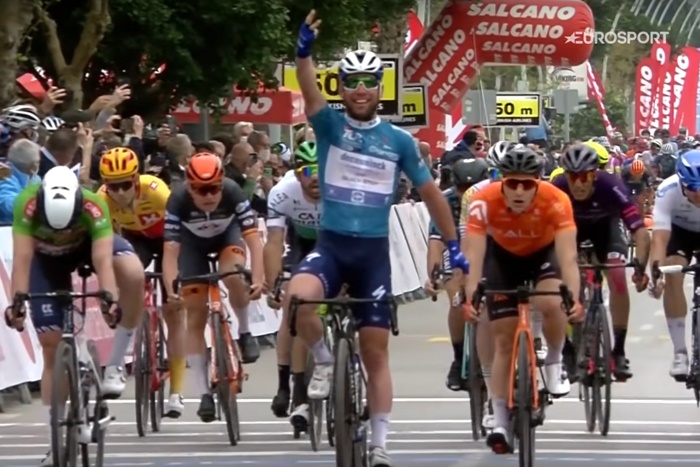
(He’s gesturing ‘three’ there, by the way.)
Three years without a win and then three in three days. It invites the old adage about waiting for a bus – except who would wait three years for a bus?
It was only the Tour of Turkey, which is not exactly the biggest race on the calendar – and he is also unlikely to earn Tour de France selection ahead of team-mate Sam Bennett, who won the green jersey last year – but it makes for a better final chapter to the Cav story than the first draft.
The Manxman finished last year repeatedly believing he was racing his final race and getting into the break purely to remind people he existed. No matter what happens the rest of the season (a Vuelta a Espana appearance seems likely), these four wins (because he won the final stage as well) represent a welcome late-career up-tick.
What’s next?
The Giro d’Italia starts on May 8. I’ll try and do a quick preview to let you know who’s riding and whatnot. You can sign up to get it (and subsequent articles) by email here.
Leave a Reply